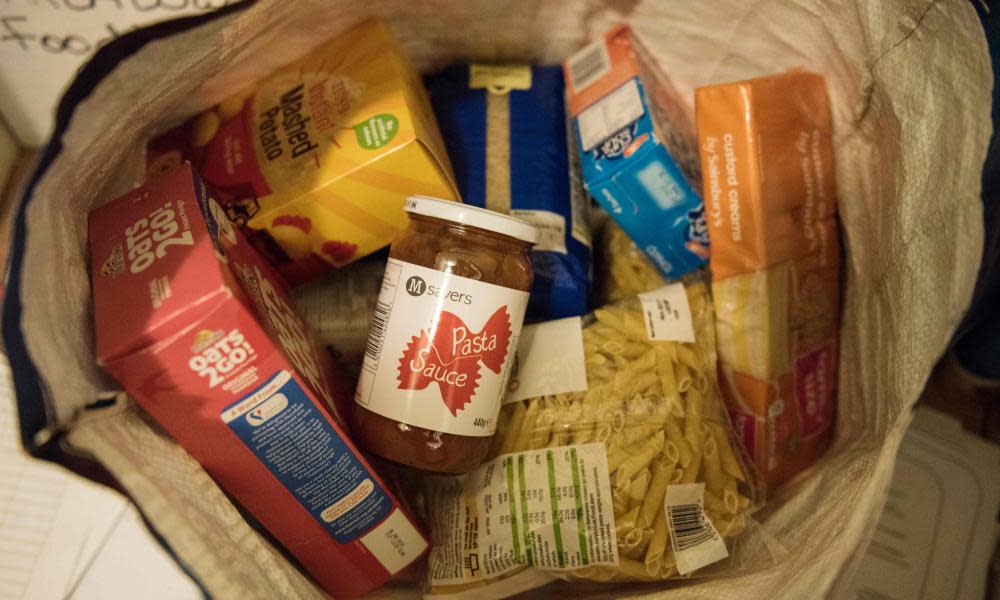People with 'nowhere else to turn' fuel rise in food bank use – study

Vulnerable people left with “nowhere else to turn” after experiencing problems with universal credit helped fuel a big increase in food bank use over the past year, according to the Trussell Trust.
The UK’s biggest food bank network, whose annual figures provide a broad index of social hardship, gave out a record 1.3m food parcels to an estimated 666,000 people in 2017-18, up 13% on the previous year.
However, food banks in areas where the full universal credit service had been in place for 12 months or more were four times as busy, recording an average 52% increase in the number of three-day emergency food packages distributed.
The trust said many universal credit claimants had come to food banks after long waits for payment and administrative problems pushed them into debt, ill health and rent arrears.
“This completely unacceptable. We need to move towards a UK where no one needs a food bank’s help, not a country where charity provision is the only defence from utter destitution,” said Emma Revie, the trust’s chief executive.
Research into the experiences of food bank users published by the trust on Tuesday found a “significant scale” of poor benefits administration, coupled with widespread evidence that universal credit provided insufficient income to cover basic living costs.
Claimants reported they found the digital-only universal credit service hard to navigate, with little or no official support or financial assistance to help them cope or tide them over a minimum six-week wait for a first payment.
Several told the trust that lack of money meant they had been forced to give up a home internet connection or smartphone, making it harder to access the benefit.
The report says: “Rather than acting as a service to ensure people do not face destitution, the evidence suggests that for people on the very lowest incomes … the poor functioning of universal credit can actually push people into a tide of bills, debts and, ultimately, lead them to a food bank.
“People are falling through the cracks in a system not made to hold them. What little support available is primarily offered by the third sector, whose work is laudable, but cannot be a substitute for a real, nationwide safety net.”
The trust called for an urgent inquiry into the administration of universal credit and an end to the benefits freeze, as well as more practical help for the poorest claimants.
The trust surveyed 284 users of 30 food banks in England, Scotland and Wales during February and March. Disabled people, claimants affected by chronic health conditions and families with dependent children were especially vulnerable to problems arising from the design or operation of universal credit.
The Department for Work and Pensions criticised the survey as a “small self-selecting sample” carried out before a series of changes came into force designed to mitigate the impact of universal credit, such as reducing the minimum wait for a first payment to five weeks and providing two weeks’ extra housing support for claimants moving on to the benefit.
Ministers were forced to introduce the changes last year after sustained criticism from campaigners, landlords, opposition parties and even Conservative backbenchers.
The trust said the fastest-growing group of food bank users over the past year was made up of people reliant on benefits for income, suggesting the government’s freeze on social security benefits for the past two years was making it increasingly hard for the poorest to meet basic living costs.
Revie said: “It’s hard to break free from hunger if there isn’t enough money coming in to cover the rising cost of absolute essentials like food and housing. For too many people, staying above water is a daily struggle.”
The trust said more than 484,000 food packages were allocated to families with children in 2017-18, 36% of the food packages provided by the trust in the year to March.
The highest reason for referral was low income (28%), followed by benefit delays (24%) and changes, including sanctions (18%). Debt run up in order to meet housing costs and energy bills accounted for an increasing percentage of food bank referrals.

 Yahoo News
Yahoo News 
